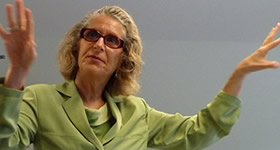Why are we so uncomfortable talking about gender issues, issues of race / ethnicity, sexual orientation, and class?
Wait a minute. Who is uncomfortable talking about these issues? I suspect the disenfranchised and marginalized are not that uncomfortable. I think it’s the “dominant” or “privileged” that find these conversations so uncomfortable.
I’m not uncomfortable talking about gender bias. I’m a woman. I’m part of the marginalized group. I’m ready, willing and want to talk with men about their mostly unearned and invisible privilege. I don’t want to be impolite or attack. But we have to talk about this stuff. And men don’t need to feel threatened. We’re socialized into these norms. And we won’t make change unless we talk about them. But men often are uncomfortable in these discussions.
Barack Obama chose to talk about race / ethnicity in public. But too many white people are uncomfortable talking about race / ethnicity. Too many heterosexuals are discomforted if the talk turns to sexual orientation.
How unfair that we make the disenfranchised raise the issues and lead the dialogue. Just another example of privilege and power trumping the marginalized.
Years ago, I was presenting a workshop to a full room at the AFP International Conference. I was talking about unearned and invisible privilege, and social injustice. I asked the audience: “What does privilege look like?” I didn’t have a chance to start my next sentence and say “Privilege looks like me, Simone Joyaux.” (And then I have this whole spiel I recite.)
Because as soon as I asked what privilege looks like, one of the audience members stood. I thought he had a question so I invited him to speak. His response: “You asked what privilege looks like and it looks like me. I’m a white man.”
He said it first. He had the courage to stand up and show what privilege looks like. And then I joined him. I said: “I’m a white, heterosexual, well-educated, affluent woman. I win, except for my gender.”
You know who you are, sir. We spoke at the end of the session. Thank you again and again for standing up in the room – with all the privilege – and owning your own. Thank you.
If we the privileged don’t have the self-awareness and courage to stand up and speak out, shame on us. How dare we expect the marginalized to do this work.

